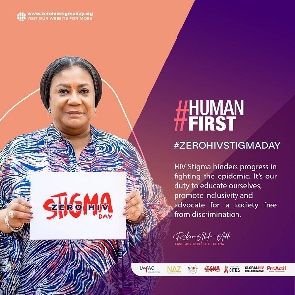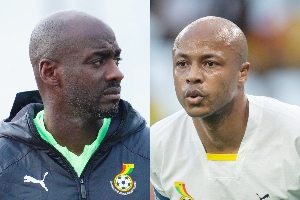Commemorating the birthday of the late South African HIV activist Prudence Mabele, Zero HIV Stigma Day is a new international HIV awareness day whose inaugural commemoration is today, July 21, 2023.
The day aims to unite people, communities, and entire countries to raise awareness of the persistent levels of stigma experienced by people living with and affected by HIV and take action to end HIV-related stigma that both violates human rights and jeopardizes efforts to end the global HIV epidemic.
Zero HIV Stigma Day represents a joint effort by NAZ (a UK-based sexual health charity whose services are dedicated to people experiencing better sexual health), the International Association of Providers of AIDS Care (IAPAC, a global network of clinicians and allied health professionals working to end the HIV pandemic), the Global HIV Collaborative and the Fast-Track Cities Institute, with their local Ghanaian partners, ProActif Global.
Recent global research and surveys find that HIV stigma remains a serious concern. According to the Joint United Nations Programme on HIV/AIDS (UNAIDS), people living with HIV who perceive high levels of HIV stigma are 2.4 more times likely to delay enrolment in care until they are very ill.
This leads to premature death and negates the prevention benefit of successful HIV treatment such as antiretroviral therapy (ART) which results in an undetectable viral load and offers people living with HIV an opportunity to live a near-normal lifespan.
Additionally, people living with HIV who are on ART and have an undetectable viral load for six months or more and take their medications as prescribed pose no risk of transmitting HIV to their sexual partners, which is the basis of the U=U (Undetectable = Untransmittable) public health message.
Her Excellency Rebecca Akufo - Addo, First Lady of Ghana writes:
“HIV Stigma hinders progress in fighting the epidemic. It’s our duty to educate ourselves, promote inclusivity and advocate for a society free from discrimination.”
Dr. Vanessa Apea, Harvard trained Ghanaian-British Physician writes:
“In this fifth decade of the global HIV pandemic, let us remember that above all, we are humans first, deserving of dignity and respect, regardless of our HIV status. Stigma thrives when we forget that HIV does not define a person’s worth or character. Let us learn to put humans first.”
Nathaniel Akwasi Oduro, Executive Director, Proactif Global writes:
“HIV stigma reinforces the misconception that persons living with the virus are somehow “less than.” Let’s break this cycle of discrimination and foster a culture of acceptance.”
About Prudence Mabele
Prudence Mabele was the first Black South African woman to publicly share her HIV status. She advocated for the rights of women and children living with HIV and against gender-based violence. She was diagnosed with HIV in 1990 and went public with her status in 1992. She set up the Positive Women’s Network in 1996.
About NAZ
NAZ is a minority-led HIV and sexual health agency with over 30 years of grassroots experience in delivering HIV care and support and evidenced-based sexual health programs to Black and Brown and minoritized communities. Its mission is to achieve true parity in sexual health outcomes for racially minoritized communities living with and at elevated risk of HIV. For more information about NAZ, please visit: https://www.naz.org.uk/
About IAPAC
Representing 30,000 members, IAPAC is the largest association of clinicians and allied health professionals working to end the epidemics of HIV and tuberculosis, as well as eliminate HBV and HCV, by 2030. IAPAC is also a core technical partner to the Fast-Track Cities network and the Secretariat for its Fast-Track Cities Institute. For more information about IAPAC, please visit: https://www.iapac.org/
About the Global HIV Collaborative
The Global HIV Collaborative (GHC) is a partnership of strategic global leaders and activists that strives to improve HIV outcomes for Black communities globally. GHC works to address the current global trajectory of HIV outcomes in Black populations and seeks to prioritize the persistent issue of unequal HIV outcomes rooted in ethnic disparities. For more information about GHC, please visit: https://hiv-collaborative.org/
About the Fast-Track Cities Institute
The Fast-Track Institute was created to support cities and municipalities worldwide in their efforts to achieve Sustainable Development Goal (SDG) 3.3 (ending the epidemics of HIV and TB), the World Health Organization goal of eliminating HBV and HCV, and SDG 11 (making cities and municipalities inclusive, safe, resilient, and sustainable). For information about the Fast-Track Cities Institute, please visit: https://www.ftcinstitute.org/
For more information about #ZeroHIVStigmaDay, please visit: https://www.ZeroHIVStigmaDay.org

Press Releases of Friday, 21 July 2023
Source: Global HIV Collaborative
July 21: Ghana celebrates Zero HIV Stigma Day
Opinions






![Kwabena Adu-Boahene [Left], Angela Adjei-Boateng [Middle] and Deputy AG Justice Srem Sai [Right] Kwabena Adu-Boahene [Left], Angela Adjei-Boateng [Middle] and Deputy AG Justice Srem Sai [Right]](https://cdn.ghanaweb.com/imagelib/pics/346/34663314.295.jpg)





